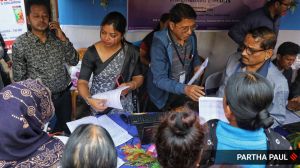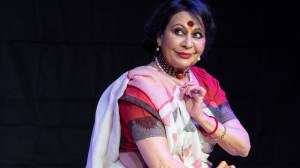Who was Nguyen Phu Trong – Vietnam’s longest serving Communist Party chief ?
Born on April 14, 1944, in Hanoi, was Marxist-Leninist ideologue who earned a degree in philosophy. Trong's political career began in the 1960s when he joined the CPV.
 The powerful head of Vietnam’s ruling Communist Party, has died, official media say on Friday, July 19, 2024. (Luong Thai Linh/Pool Photo via AP, File)
The powerful head of Vietnam’s ruling Communist Party, has died, official media say on Friday, July 19, 2024. (Luong Thai Linh/Pool Photo via AP, File)“A country without discipline would be chaotic and unstable,” Nguyen Phu Trong, the hard-line General Secretary of Vietnam’s Communist Party said in 2016 after being re-elected.
Trong, who oversaw the country’s economic and geopolitical transformation and reshaped its leadership with his “blazing furnace” anti-corruption campaign, died on Friday at a hospital in Hanoi. He was 80. He was a name that resonates deeply within the fabric of modern Vietnam. Trong was a prominent figure in Vietnamese politics, serving as the General Secretary of the CPV since 2011.
For twelve years, Trong held the highest position of authority within Vietnam’s Communist hierarchy. Serving an unprecedented three terms as General Secretary and nearly thirty years on the Politburo, he consolidated power in one of the world’s last remaining Communist regimes, diminishing the previously collective leadership structure that defined the country’s Communist Party.
Born on April 14, 1944, in Hanoi, was a Marxist-Leninist ideologue who earned a degree in philosophy. Trong’s political career began in the 1960s when he joined the CPV. He quickly rose through the ranks, demonstrating a strong commitment to the party’s ideological foundations and governance.
Throughout his career, Trong has held several important positions, including head of the Party’s Organization Commission and the Chairman of the National Assembly. His leadership was marked by a focus on anti-corruption measures, economic reforms, and strengthening Vietnam’s international relations. Under his guidance, the CPV emphasised the importance of maintaining a socialist orientation while adapting to global economic changes, a policy known as “Doi Moi,” which translates to “Renovation.”
Trong studied in the Soviet Union from 1981 to 1983, leading to speculation that under his leadership, Vietnam might move closer to Russia and China.
However, the Southeast Asian nation followed a pragmatic policy of “bamboo diplomacy,” a phrase he coined referring to the plant’s flexibility, bending but not breaking in the shifting headwinds of geopolitics.
Trong’s tenure as General Secretary coincided with a period of significant change in Vietnam’s foreign policy. He advocated for a balanced approach to international relations, seeking to foster cooperation with both Western nations and traditional allies like Russia and China. Trong’s diplomatic efforts included promoting Vietnam’s role in regional organizations such as ASEAN and enhancing bilateral ties with major powers.
In addition to his political and diplomatic work, Trong was a key figure in the CPV’s ideological education, emphasising Marxist-Leninist principles while encouraging pragmatic approaches to governance. His leadership style was characterised by a blend of firmness in principle and flexibility in tactics, allowing Vietnam to navigate complex geopolitical landscapes effectively.
Trong viewed corruption as the single gravest threat to maintaining the party’s legitimacy.
He launched a sweeping anti-corruption campaign known as the “blazing furnace” that targeted both business and political elites. Since 2016, thousands of party officials have been disciplined, including former presidents Nguyen Xuan Phuc and Vo Van Thuong, and the former head of parliament, Vuong Dinh Hue. In total, eight members of the powerful Politburo were ousted on corruption allegations, compared to none between 1986 and 2016.
Despite facing challenges, including economic pressures and regional tensions, Trong remained a steadfast advocate for Vietnam’s sovereignty and development. His leadership was instrumental in positioning Vietnam as a rising power in Southeast Asia, balancing its historical ties with a modern approach to international diplomacy.
Trong’s health had been declining for several years. In 2019, his extended absence from various state and party events raised concerns, with the government attributing his condition to the weather and work intensity. Despite expectations that he would retire at the end of his term in 2021, the Communist Party granted him an unprecedented third term, contravening its own constitution, which limits party chiefs to two terms.
He is survived by his wife, Ngo Thi Man. While the Vietnamese government does not typically disclose details about the children of party officials, it is believed that he is also survived by a son and a daughter.
- 01
- 02
- 03
- 04
- 05































